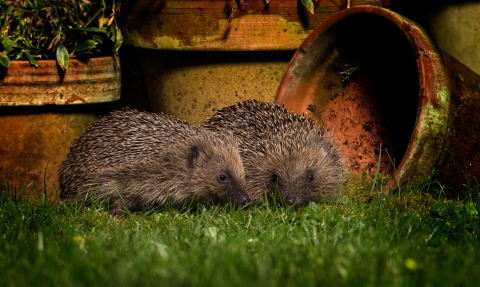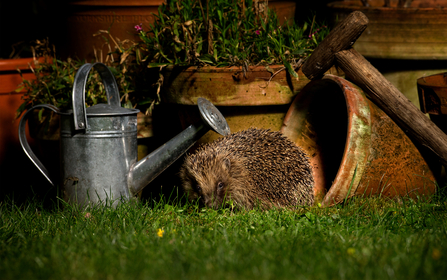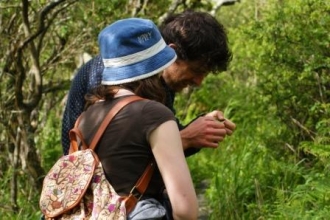
© Jon Hawkins
Hedgehogs - your guide to Britain's most loved creature and how to protect them
Cornwall's hedgehogs are disappearing. Let's protect Britain's most loved creature.
Here's everything you need to know about Britain's best loved creature and actions you can take to give them the best chance of recovery.
Jump to:
Information and Hedgehog facts
Actions you can take to help hedgehogs
What we are doing: Operation Hedgehog
Donate to the hedgehog appeal

©Jon Hawkins
Information and Hedgehog Facts
How well do you know these spiny garden visitors?
Where can hedgehogs be found?
Hedgehogs are found across the UK, absent only from some Scottish islands. Gardens, hedgerows, woodlands, grasslands, parks and cemeteries are all important hedgehog habitats.
How far do hedgehogs travel?
Adult hedgehogs travel between 1-2km per night over home ranges as big as 10-20 hectares in size. In suburban areas, this means they range over entire housing estates and neighbourhoods.
What do hedgehogs eat?
Hedgehogs are most famous for eating slugs and snails, but they eat a huge range of other garden invertebrates too. In fact, beetles, earthworms and caterpillars make up most of their diet, whereas large snail shells can prove tricky for hedgehogs to tackle. If you want hedgehogs, you need creepy crawlies in abundance whichcan be attracted by planting a variety of different plants and creating habitats such as log piles.
When is the breeding season?
During the breeding season amorous hedgehogs can be seen (and heard!) circling each other with snorts and grunts. Young are usually born from May onwards
in litters of up to five and the young leave the nest after around four weeks. Baby hedgehogs (or hoglets) are born with their spines sheathed beneath their skin which then emerge a few hours after birth.
Are hedgehogs nocturnal?
"Hedgehogs are nocturnal, which means they shouldn’t really be seen out in daylight hours. Some of the exceptions to this are pregnant females gathering nesting materials just before she gives birth, or a new ‘Mum’ taking a break from the nest to get food and water while her young sleep." - British Hedgehog Preservation Society
Do hedgehogs hibernate?
While many animals have adapted to cope with the harsh conditions of winter, hedgehogs are one of only a handful of UK mammals to truly hibernate, along
with bats and dormice. Depending on the weather and their body condition, they enter a state of torpor from October/ November to March/April, lowering their body temperature and slowing their metabolism to save energy. Hedgehogs must feed intensively and be in great condition before hibernating if they are to have enough reserves to last the winter.
Did you also know?
- On average hedgehogs live for 2 to 5 years in the wild, but some have lived up to 10
- An adult hedgehog has up to 7,000 spines and a small, hidden tail
- Particularly slippery slugs are sometimes de-slimed with deft forepaws before eating

Gillian Day
Actions you can take to help hedgehogs
You can take action right now - small changes that make a big difference
Create hedgehog highways
Hedgehogs need to be able to roam far and wide in search of food, mates and nesting sites. Get together with your neighbours to cut a 13cm x 13cm hole (5in) hole in your fence or dig a channel beneath garden boundaries to connect your gardens. You can then add your hedgehog hole to the national network at HedgehogStreet.org.
Avoid the use of pesticides
Ditch the slug pellets and avoid the use of pesticides. Hedgehogs are natural “pest” controllers and need a plentiful and varied supply of invertebrate prey to stay healthy.
Make water safe
Hedgehogs are great swimmers but can sometimes struggle to climb out of steep-sided ponds and many drown. Provide a ramp from a plank wrapped in chicken wire or create shallow areas at the edge so they can scramble out.
Provide nesting sites
Log and leaf piles, wilderness areas and purpose-built hedgehog homes make great places for hedgehogs to nest and hibernate. Fallen leaves also make the
perfect nesting material, so make sure you don’t clear all of these away.
Grow a wide variety of plants
Attract plenty of natural hedgehog food by keeping your garden diverse with a wide variety of habitats e.g. ponds, log piles, hedges, and a wide range of plant types. Don’t be afraid to let your grass grow a little wild and leave some leaf litter – as both are important homes for the hedgehog’s prey.
Be aware of dangers
Check for hidden hedgehogs before lighting bonfires, strimming and mowing the lawn. Keep plant netting, tennis nets and household rubbish above ground level to prevent entanglement.
Take action if you find a hedgehog
If you find a hedgehog and it is out during the day, wobbly, very small (late autumn especially) and/or is a hoglet/baby, and have any concerns, please give Prickles and Paws a call for advice on 07926576164.
Our Environmental Records Centre (ERCCIS) encourages anyone to submit wildlife records, whatever your experience and no matter how common or widespread the species. If you see a hedgehog (at any time and in any condition) please consider adding a record of it. Sign up and submit a recording on the ORKs (Online Recording Kernow and Scilly) service.



